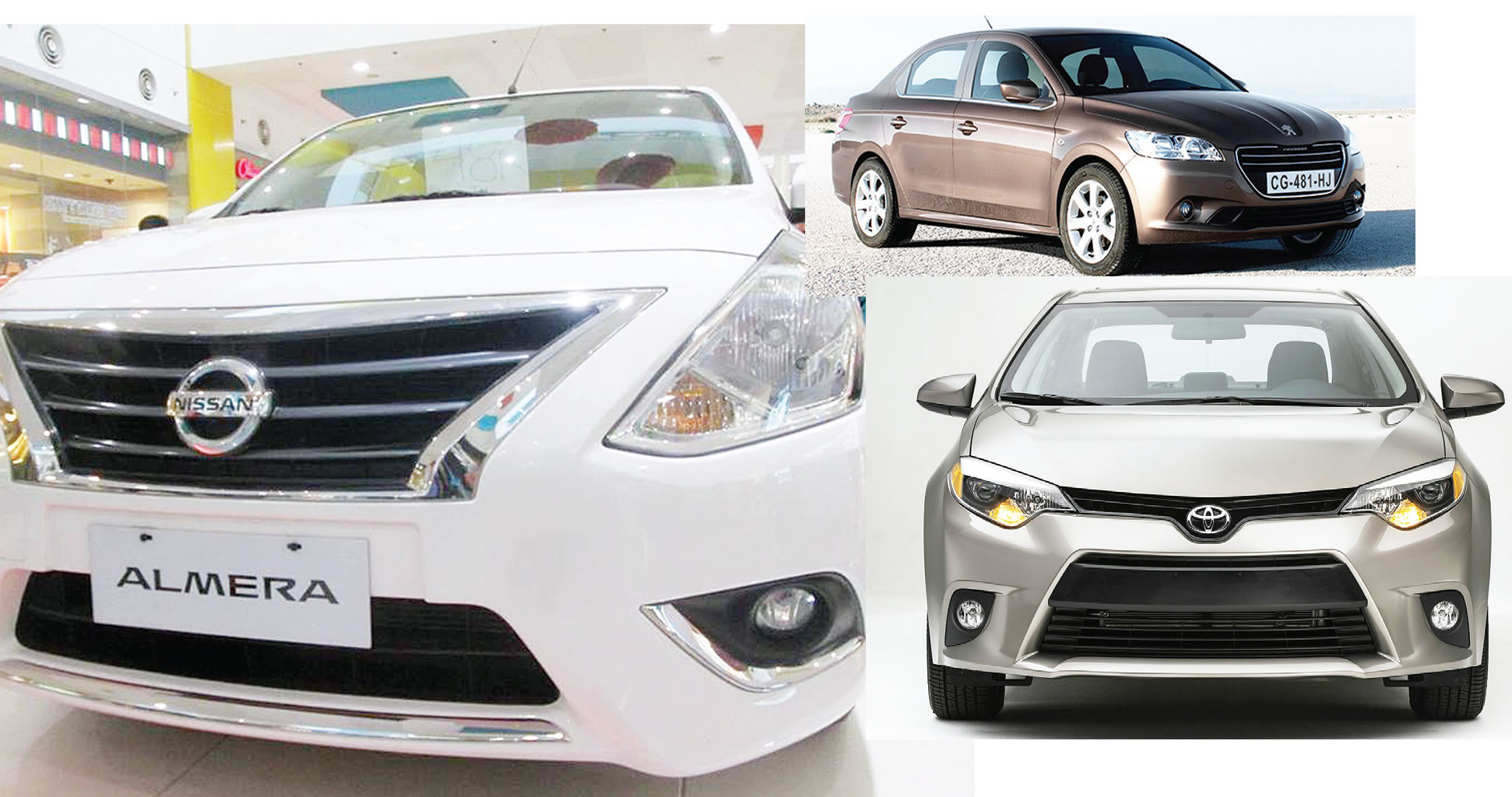
In this report, VICTOR AYENI writes about how car dealers upgrade automobiles, the opportunities of the business, and the challenges confronting it
Chidera Jude stood to his feet with a bright smile on his face; his right hand was outstretched for a handshake while he held his mobile phone in his left hand.
A customer had just walked into the shop of the 34-year-old and he was warmly received by his office assistants.
Jude, whose shop is in Berger, in the Mile 2 area of Lagos State, professionally upgrades automobiles from one model to another and also sells vehicle spare parts.
As the car upgrader discussed with his customer on that Thursday morning when our correspondent visited his shop, the area swelled with patrons who wanted to purchase spare parts.
Jude told Sunday PUNCH he had been in the business of upgrading vehicles for more than five years.
“The primary purpose is to enhance their aesthetics and make them look brand new. We upgrade vehicles from one model to another as our customers request by changing their engine or some outdated spare parts to make that car model more recent without the owner having to purchase a new one entirely, which would be far more expensive.
“We have upgraded many luxurious cars; sometimes we convert the brands. For example, we have upgraded a Gx470 Lexus into a Landcruiser Prado 2021 model. We have upgraded a Toyota Prado 2010 model interior to a 2022 model and we have converted a Lexus Gx460 2010 into a 2021 Gx460 model.
“The function of converting or upgrading cars is simply to cut cost and obtain the same or relatively same satisfaction because the model from one year to another does not always involve a change in the engine or gear transmission capacity. Lexus Lx570 2010 model has the same engine capacity as the 2020 model.
“Toyota Prado 2010 has the same engine capacity as the 2020 model and the Lexus Gx460 2010 has the same engine and gear transmission capacity as the 2020 model. The same applies to the Toyota Hilux 2010, which has the same engine and gear transmission capacity as the 2020 year model,” he explained.
Breaking down the stages involved to our correspondent, another car upgrader in the area, Nelson Okigwe, noted that automobile modification was not limited to car models.
He said, “Aside from the car models which we upgrade or convert, we also revamp various parts of the car, both the interior and exterior. We revamp the seat, roof, dashboard, steering, gears, headrests, and even doormats.
“Each of these processes has its price and it varies with each upgrader you patronise here. But it is best if you know who you are dealing with and there is mutual trust so that you can get things done at an affordable price.”
Serving different purposes
Ladipo Market, Mushin, is one of the major hubs of auto spare parts sellers in Lagos. On any given day, it is a beehive of activities, a place where many car upgraders and converters have their workshops.
A 32-year-old spare parts dealer in the market, Obidi Ikenna, pointed out that car upgrading and conversion were not as novel as most people thought.
He said, “People have always utilised them for different purposes. Those whose cars were badly damaged in road accidents come to us, as well as those who simply want a higher taste in what they want their vehicle to look like.
“It is the recent awareness created by social media that has made more people know about this transformation. Many of the car upgraders here in Ladipo have created social media accounts to showcase their works and convince the public that it is a legitimate business and it really is.
“What I think is the challenge is the lack of formal education among the company owners. They might know the technical know-how but they lack the educational background to uphold that knowledge.
“Car converters basically work with us spare parts dealers. In cases where some customers prefer to patronise us instead for these parts, they come to us. So, as you can see it is a valid business enterprise. It is not aimed to scam or deceive people.”
Another car upgrader, Damian Anazodo, said, “We can make a 2007 car model look like a new 2020 car model and the purpose of each upgrade is to make the vehicle look better or perform better.
“We don’t have to be in Lagos to offer these services. I reside in Abuja but my company is in Lagos and we still get much patronage from people. Importers rely on us as well as individuals whose cars need overhauls due to damage.”
Describing car change as ‘facelifting,’ a Nigerian online spare parts depot, Ladipoexpress, stated the different reasons car owners sought the process.
“Car producers themselves discharge facelifted vehicles as new models and genuinely on the off chance that they can do that. This is to increase profit. This is generally why most sellers update their vehicles. They do such to amplify profit. Putting additional expenses on an overhauled vehicle is simpler when the vehicle is updated.
“They convert cars in order to cover up accident marks. This is one more motivation behind why a few sellers and importers decide to redesign vehicles. This is generally for importers who purchase rescued cars. Instead of supplanting the harmed parts, particularly the lights and grille with the first parts, they simply do an overhaul.
“They do so to have better-looking cars. The point of this is one more significant and interesting point when you need to redesign your vehicle. Where do you expect to get the updated parts from? There are individuals that utilise our nearby extra part advertisers like the one we have in Ladipo, Lagos.
“There are a few people that actually purchase theirs from outside the nation and afterward have them sent to Nigeria. Where you purchase your updated parts depends on the degree of the redesign you need to complete, the time you have, and afterward your cash,” the website said.
Public anxiety
Despite the technological prospects of automobile conversion, some Nigerians have expressed scepticism about it.
A computer engineer, Abiodun Balogun, expressed doubts about the validity of car conversion.
“I know it is a good business model but when I saw one where they made a 2010 Prado look like a 2020 model, I started to have trust issues about car upgrading.
“This car upgrading trend in Lagos might be fun until when they start to find that armed robbers are using it to change the identity of stolen cars and I know this is happening,” he added.
Also expressing his scepticism, an auto dealer, Bamidele Malik, noted that the enterprise could pose a problem for prospective car buyers.
“Lexus IS has been upgraded by people to make it look like a third-generation car with larger grilles, and by implication, it now looks more expensive than it really is.
“They have also upgraded Lexus LX570 from a 2010 model to a 2018 model and they have also upgraded its inside to have a Tesla screen, so that makes prospective customers wary of scams while purchasing these vehicles.
“There is another car model upgrade which I find quite ridiculous, the Range Rover Sports. They make the 2010 model look like 2019 but you can easily spot the difference based on size. Prado is literally the most face-lifted car model in Nigeria. Within a number of hours, they can upgrade both its interior and exterior from a 2008 to 2022 model. This makes it a bit difficult for customers to trust us because they might not be able to tell which is which,” he lamented.
An auto engineer, Wahab Opeyemi, explained that people could know if a vehicle had undergone a facelift if they compared its exterior features to those of previous years.
“Upgrading a vehicle does not change its registration or chassis number nor is there any need to obtain a different paper for it, so the fear people exhibit regarding that is unfounded.
“People can determine if their car is a facelift model by looking up the year and model of your car online and comparing its exterior features to the previous model year. They can also consult the owner’s manual or maintenance records, which may provide information about the specific features of their car.
“An upgraded car model could have a different production date or a different Vehicle Identification Number from the previous model year. So, prospective car owners can check the VIN with their dealer to verify the exact specifications of their vehicle.
“Car upgrading is not bad in itself. It was a practice that was adopted so people would avoid buying newer cars, but I must let you know that even car manufacturers like Toyota Highlander, Toyota Prado, and the Mercedes-Benz E-Class upgrade their models. The difference is that they use more advanced technology such that those models are better than the earlier ones,” he added.
A Nigerian automobile site, Naijauto, highlighted some of the drawbacks associated with car upgrading.
“Whenever you upgrade your car in Nigeria, it automatically loses its value but you won’t know this till you are about to resell. Used cars in Nigeria get heavily scrutinised when a potential buyer comes to pick them up.
“For instance, in the case of a 2007 Lexus upgraded to a 2014 model; the back now looks older than the front and there are annoying gaps on the body of a badly face-lifted Lexus SUV in Nigeria. These evident gaps and clearances just make the whole vehicle look ugly. Also, such gaps can easily let water droplets into unnecessary parts of the car during rainfall.
“When you upgrade your car in Nigeria, it doesn’t make it the type of car that people are searching to buy anymore. Believe it or not, some of the cars with the worst resale value can sometimes sell even faster than upgraded cars in Nigeria.
“In all honesty, upgraded cars for sale in Nigeria won’t be the first option people are willing to pick except when they are also in love with the idea of upgraded cars too.
A lot of face-lifted cars cannot be reversed no matter how hard you try. Even when you try to reverse it, those parts you cut would make it impossible. If your car is supposed to become a high-value classic car in 10 years’ time, you can never claim that title for your car because it has been face-lifted,” the website said.
However, a car upgrader, Daniel Oguadi, argued that there were some car upgrades that might be avoided and some that posed little or no problem.
“I do not advise people to change the full dashboard of their cars. This is not a good practice and it has some side effects.
“When you change your dashboard, you tamper heavily with the onboard wiring system of your car and this might lead to a lot of error codes on your dashboard, which means you will get a very faulty car at the end of the upgrade.
“I have observed that this is common with Mercedes-Benz and Lexus cars that were subjected to upgrades. The car owners want the same dashboard and cockpit as the newest model so the mechanics get to work by replacing the dashboard parts with the latest designs. It often doesn’t end well.
“I also advise my customers to avoid car upgrades that require cutting the metal parts of their car. Any upgrade that requires your car chassis is usually a bad facelift for your car. Before getting carried away with the possible end result, remember the saying that you cannot put a good building on a bad foundation. Once the foundation is bad, then there’s no point at all in the entire process.
“Also, when you cut a car’s chassis or skeleton, you have reduced the safety rating of the car. In case of any accident, the car will not save you because you have sacrificed all that for looks,” he stated.
Car redesigning in other climes
Sunday PUNCH gathered that in several countries, digital technology is often employed in the manufacturing and upgrading of automobiles.
In China, automobile final assembly factories are controlled by digital systems which provide accurate and orderly assembly of parts prepared in advance.
The country has deployed digital technologies to empower the transformation and upgrading of the automobile industry, which has contributed to its economic growth.
According to a development report on China’s digital economy released in 2022, the value-added output of the digital economy in Guizhou increased by 20.6 per cent year on year in 2021, and the growth rate was 4.4 per cent points higher than the national average, ranking first in the country for seven consecutive years.
In Germany, different terms are used for car upgrades. It is variously described as car tuning, performance upgrades, and design modification.
Car modifications, either performance mods or looks and design, often need permissions. According to the German Road Traffic Act and Authorisation of Vehicles for Road Transport, only three kinds of modifications require such permissions.
German authorities are expected to approve the vehicle type change, assess if it would pose a danger to road users, and monitor if the exhaust or noise behaviour has deteriorated.
There are more than 400 car tuning and performance firms registered in Germany and information about the modifications is mandated to be discussed with the inspection company or officials at the vehicle registration office.
In Japan, Toyota launched a programme to allow owners of certain older Toyota and Lexus models to have their vehicles modernised or upgraded with the current technology and materials.
This service, according to Motor Illustrated, was offered by the company’s Kinto Mobility division and aims to maximise the life of vehicles already on the road instead of scrapping them in favour of a new vehicle, which is more environmentally friendly.
In the country, customers can choose to have some of the latest technology added to their cars, including many active safety systems.
For example, blind spot monitoring and rear cross-traffic alert can be fitted, as well as kick sensors to activate the power tailgate when the driver’s hands are full.
In the United Arab Emirates, cars can only be legally modified or upgraded, otherwise, motorists who make illegal modifications to their vehicles can be fined.
According to the country’s Federal Traffic Law, motorists who modify their cars or engines may be fined Dh1,000 (N213,964), and they may be slapped with 12 traffic black points.
UAE regulations state that car engine modification can only be done as long as it complies with the given emission and noise standards. If the new engine requires more power than the original engine, then the car’s seat belts, front, and rear brakes have to be upgraded as well.
While South Korea is often well disposed towards car tuning, car owners must receive pre-approval and tuning examination on 15 vehicle structures and equipment of a total of 28 items.
The country’s Ministry of Land, Infrastructure, and Transport, however, exempt approval for several pieces of equipment such as power transfer units and lighting systems and eased tuning standards for two-wheeled vehicles.
In the United Kingdom, car modifications are also expected to be done only within the ambit of the law, otherwise, the motorist’s car is declared illegal to move on roads and its insurance is invalidated.
According to UK regulations, the changed brakes must be installed by a professional engineer, and big bore exhausts are prohibited due to extra emissions.
The country’s authorities monitor the car’s spoiler to ensure it has no sharp edges and is fitted securely to the bodywork of the car so it won’t detach while driving and the neon light tubing must not be on show.
In South Africa, car upgrade laws are quite liberal so far as the modifications are valid and the fitment of manufacturer-approved accessories do not affect the warranty of vehicles.
Sustainable environment required
A mechanical engineer, Amos Awojide, told Sunday PUNCH that the car upgrading industry was faced with the challenge of a hostile business environment.
He said, “Many of the car upgraders learned the business; they are not mostly mechanical engineer graduates but they train people. I see it as a potentially great business that can provide jobs for youths who wish to be trained in it. I know some car converters who have singlehandedly trained dozens of young men.
“Actually, they need a favourable environment in order to sustain their business. For example, some of the spare parts they use are sourced from other countries, and if there is a coherent foreign policy in place it will help their businesses to thrive and create room for technological development.
“But there is a negative tendency for the government to target legitimate business owners in Nigeria with multiple taxation which kills their businesses. Taxation is good but it should be fair and applicable to all.
“There are many wealthy businessmen and women in this country who do not pay taxes; the agencies should go after them, not the people who are still trying to find their feet in the hostile economic environment we have here.”
Awojide added that the country needed to regulate the process of car upgrading in order to protect it from illegal operations.
“There is a need for regulatory agencies to protect vehicle upgrades from abuse. Not everybody wants to be seen in a 2021 car externally but a 2011 car internally, so there has to be a balance even while the business is a legitimate one.
“These legal checks and balances will ensure that customers are not shortchanged by purchasing cars whose models have been modified and it will also make it easy to identify those doing the facelift for legitimate purposes and those who do it for illegal activity,” he said.





